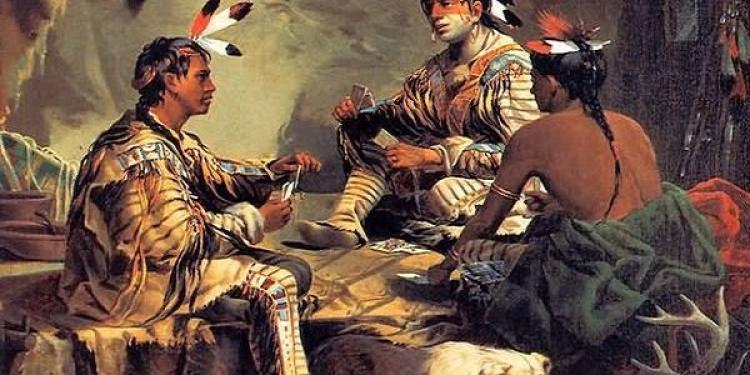A History of Gambling in America (part1)
Posted: July 25, 2015
Updated: October 6, 2017

Gambling in America had its roots in Native American culture
Although gambling already had an earlier beginning in the England, the settlers of the New World were quick to bring their culture to the New World. Many would say the very foundation of the United States of America was based on the gamble of British settlers arriving at Jamestown. Risking the livelihoods of themselves and their family, they help forged a nation that would for a long time lead the World in gambling.
• gambling was considered a part of the sacred rituals or worship
• In 1610 race horsing arrived in Virginia and was all levels of society took part
• Lottery funds built much of the colonies infrastructure as well as Universities
These early beginning were the heart of US gambling news yet to come. Another important part of this early development is the strong gambling history that was held by the Native American tribes throughout the continent. Although Native American Tribes wouldn’t have their own casinos until over 200 years later, their systems of gambling were already in place and were driven by the same desire.
Americans gambled before the settlers’ arrival

Gambling in the United States had its roots in Native American culture. The Native Americans had a thirst for gambling that surpassed their new colonial neighbors. In fact, gambling was considered a part of the sacred rituals or worship. Games such as lacrosse and an alternate form of checkers pitted the skills of the indigenous people against each other. Equally popular were games of chance such as the rolling of bones and dice. Unlike popular beliefs, sometimes the amounts that were wagered were substantial.
Horses and other prized possessions were often gambled. There were even times when sports betting wages were so high and goods were low that forced people offer themselves as rewards in the form of slave labor. The Native Americans felt that gambling was a preferred alternative to warfare and peacefully redistributed wealth among the members of their tribes.
The comradery of competition and the tribal pride produced through competition between members of tribes equaled the overall sacrament of community. When the English arrived in the 17th century, they brought along their gambling spirit with them in the form dice and cards with. Gambling proved an entertaining activities to the early settlers in their free time. By 1610, seven race horses had arrived in Virginia and soon the aristocratic sport of horse racing had taken hold.
As was one of the goals, all the common folk as well as upper stock went to horse races as they celebrated the benefit of living in a world free of British control. As the settlers were quickly establishing gambling as part of their pre-national identity, the British at home were starting to blame their dwindling funds from the New World on its inhabitants desire to gamble.
Colonials used the lottery for revenue

The British also new that the living satisfaction of the settler was pivotal to their production. To provide an answer to their dilemma, the English voted to instill a lottery among the settlers. Without a banking system, taxes or any other way for the British Government to draw money from the new settlements, the lottery seemed to be the best alternative.
For the next 100 years, this practice proved successful as the settlers of the new world used tax money to infrastructure such as roads, towns and eventually the New World’s first universities like Harvard, Yale and Princeton. As the lottery provided a more effective, “gentle” way to tax, other settlers started to find additional means to create revenue. The fighting of animals such as mountain lions and bears were organized. Bear baiting and cockfighting also proved popular.
These practices soon were criticized by the aristocracy because they felt these activities deterred the working class from their jobs. A rift started to form between the combined moralists and the aristocracy, who wanted to limit gambling and the working class, who felt they were limited in leisure activities. Since gambling seemed to getting out of hand, the English Government instilled the first US gambling laws and officially outlawed the lottery in the colonies.
It wouldn’t be long though before the colonists officially protested against the England in the form boycotting tea that was imported from the India. Soon the colonial army led by George Washington, needed a way to fund their campaign. The National lottery was established and 100,000 tickets were sold with prizes ranging from USD 5 to USD 50,000. The winnings were returned to colonists in the form of the first national bonds or promissory notes paid in a five-year period time.












